Supreme Court immunity case: Updates of oral arguments in Trump's fight for immunity
Can presidents get away with murder?
Nine Supreme Court justices heard Donald Trump’s arguments today that yes, maybe they can.
The former president's lawyers say all presidents are immune from prosecution for anything they do in office – even murder, bribery, and corruption. The only way to hold one criminally accountable, Trump's attorneys will argue today, is if a president is first impeached in the House of Representatives and then convicted by two-thirds of the Senate.
Here are USA TODAY's live updates from Trump’s remarkable stand at the Supreme Court.
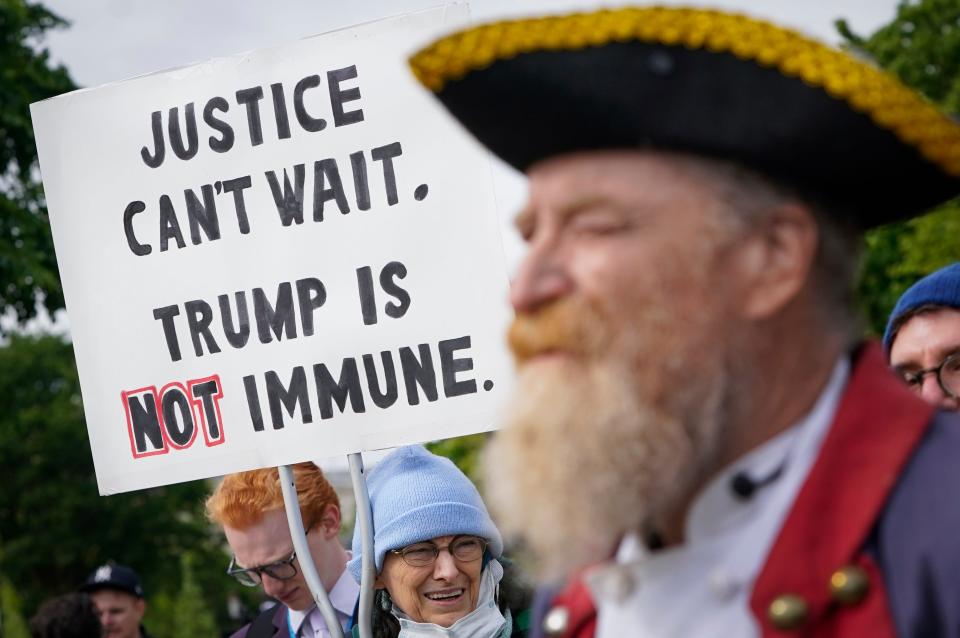
The case is submitted
The historic arguments wrapped up after more than two-and-a-half hours of debate with Trump’s attorney, John Sauer, forgoing his opportunity for a final rebuttal after the Justice Department made its case.
“I have nothing further,” Sauer said.
And with that, Chief Justice John Roberts declared that the case is submitted.
--Maureen Groppe
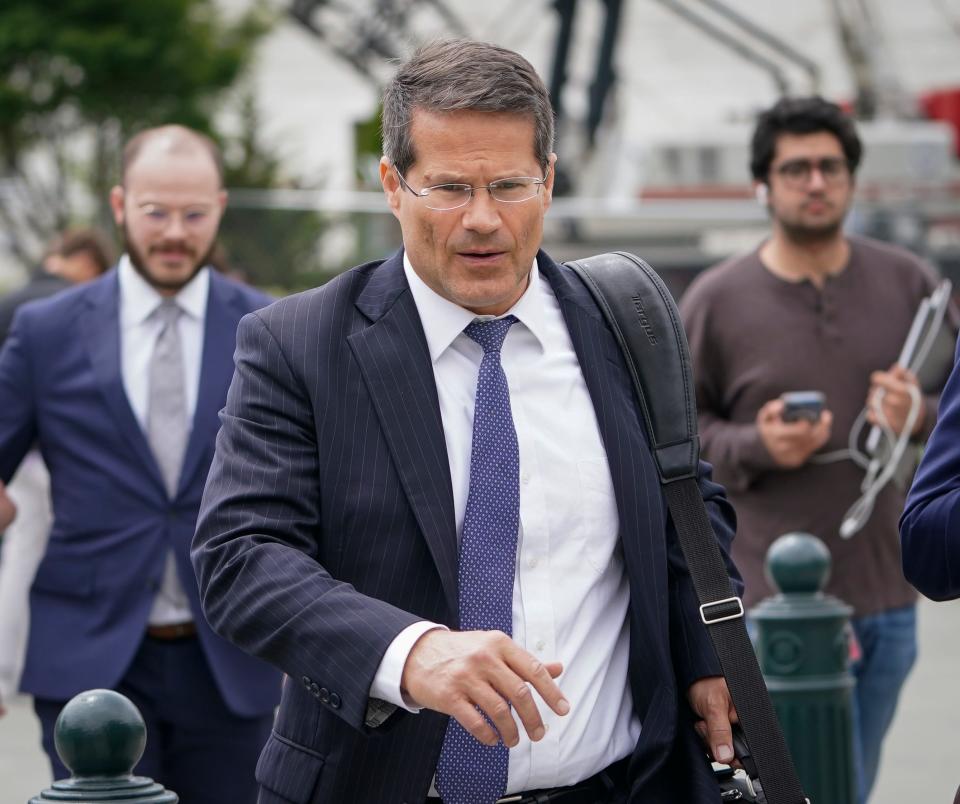
Jackson pushes for quick, narrow decision
Justice Ketanji Brown Jackson appeared to be trying to convince her colleagues to decide the case quickly and narrowly.
If the court wanted to use the case to decide all the possible times when a president does or doesn’t have immunity, she asked the Justice Department, “is this the right vehicle to hammer out that test?”
“I don’t see any need in this case for the court to embark on that analysis,” Justice Department Michael Dreeben responded.
--Maureen Groppe
Barrett looks for way for Trump trial to proceed
Justice Amy Coney Barrett asks the Justice Department whether the government can get to trial faster by prosecuting only on the Trump acts that his lawyer agrees are private conduct so are not immune.
Michael Dreeben, the Justice Department attorney, said Trump’s official and private acts are part of an “integrated conspiracy.”
But he added that a trial could proceed by allowing the government to introduce anything considered an official act as information that has relevance even if not a crime itself.
--Maureen Groppe
Does presidential motive matter?
Justice Neil Gorsuch pressed the Justice Department on whether the court should consider the motive of a president when deciding whether a presidential act deserves immunity. Everything a president does can be seen through the prism of his interest in getting re-elected, he said.
Michael Dreeben, the Justice Department’s attorney, said motive doesn’t have to be considered for a core presidential act – such as a veto, or appointment – which is protected from prosecution.
“None is involved in this case,” Dreeben said.
Gorsuch said he’s not asking so much about Trump’s case but whether accusations about a president’s motives can be a future basis for prosecution.
“We’re writing a rule for the ages,” Gorsuch said.
Dreeben said wanting to get re-elected is not an illegal motive.
“And you don’t have to worry about prosecuting presidents for that,” he said.
--Maureen Groppe
Ham sandwiches, grand juries and solar eclipses: Alito has questions
Justice Samuel Alito asked Justice Department attorney Michael Dreeben if a former president should be left to the mercy of prosecutors, noting the old saying on the pliability of grand juries: That grand jurors would indict a ham sandwich if a prosecutor asked them to.
Alito asked Dreeben if he knew of a single case in which a federal prosecutor had asked a grand jury to indict a suspect “and the grand jury refused to do so.”
Drebeen said it had happened.
“Every once in a while there’s an eclipse too,” Alito replied. No prosecutor wants to indict without sufficient evidence, Drebeen said, because the case would end in an acquittal.
--Dan Morrison
More: What does 'SCOTUS' mean? Here's a brief rundown on the country's highest court.
Trump back in New York courtroom
As attorneys at the Supreme Court argued over a president’s ability to escape prosecution for official acts, Donald Trump returned to the Manhattan courtroom where he is on trial on charges he doctored business records to cover up a $130,000 hush money payment to adult film star Stormy Daniels. Trump entered the courtroom at 11:22 a.m. ET, taking a look at reporters in the audience as he walked past them to the defense table.
– Aysha Bagchi
Trump named unindicted co-conspirator in Arizona election case
Former President Donald Trump was named an unindicted co-conspirator in the Arizona fake elector case unsealed yesterday. The indictment charges 18 state Republicans and former Trump aides including former White House chief of staff Mark Meadows, former New York mayor Rudolph Giuliani and attorney John Eastman.
The defendants are charged with crimes including conspiracy and forgery for falsely claiming they were presidential electors and that Trump won the state in the 2020 election. Trump was identified as “unindicted coconspirator 1" in the indictment.
--Bart Jansen
All That Jazz: Demonstrators drum, clang, and sing their views of Trump
As justices and lawyers solemnly discussed the finer points of law inside the Supreme Court, the scene outside featured the clang of bells, the shrill of whistles, the throb of electric music, and the chants of demonstrators - most of them anti-Trump.
“The whole world is watching!” a crowd of demonstrators chanted at one point. A small brass band serenaded the crowd of three-to-four dozen with jazz-like tunes.
In addition to attacking Trump, the crowd also weighed in on other issues, particularly abortion rights and the campaign between Trump and President Joe Biden. “Feminists vs. Fascists,” said one sign.
The two sides exchanged a few f-bombs, but nothing serious broke out and the dozen or so police officers who watched the proceedings had little to do.
-- David Jackson
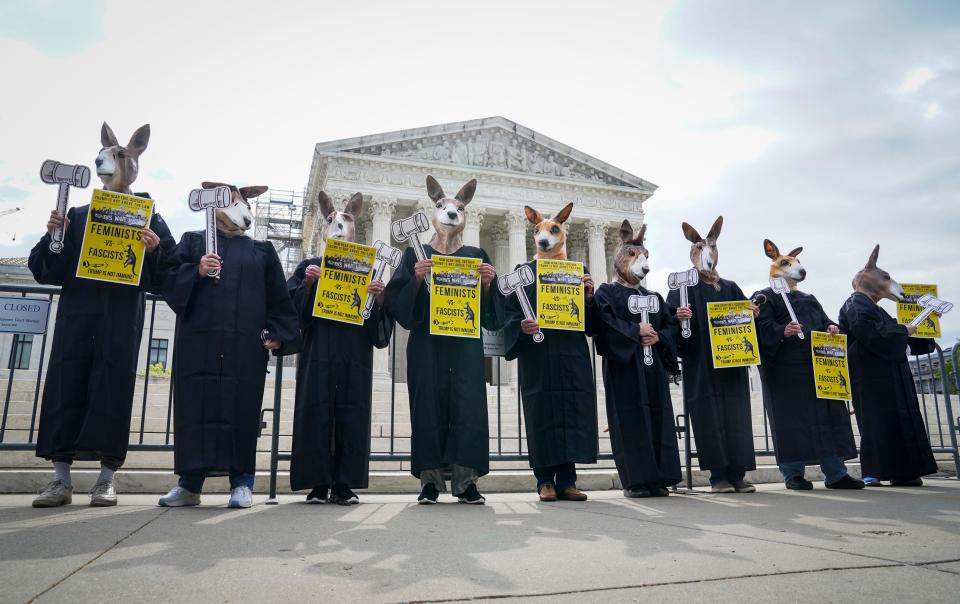
Roberts asks what protects against political prosecutions
Chief Justice John Roberts pressed on whether there are enough protections against retaliatory or harassing prosecutions for presidents.
Dreeben, the Justice Department’s lawyer, said politically driven prosecutions would violate the Constitution.
The chilling effect of prosecutions is one of Trump’s main arguments for why presidents should have immunity.
--Maureen Groppe
Who are the conservative Supreme Court justices?
There are six conservative-leaning justices, making up the majority of the Supreme Court bench: Chief Justice John Roberts, along with Justices Samuel Alito, Brett Kavanaugh, Neil Gorsuch, Amy Coney Barrett and Clarence Thomas.
Thomas is the longest serving of the group, nominated by former President George H. W. Bush in 1991. Former President George W. Bush nominated Roberts and Alito in 2005, while former President Donald Trump nominated Kavanaugh, Gorsuch and Barrett.
– Savannah Kuchar
More: Who are the current Supreme Court justices? Get to know the bench in 2024.
Thomas raises the 1961 Bay of Pigs invasion of Cuba
Apparently picking up on Justice Elena Kagan’s earlier questions touching on a military coup in the U.S., Justice Clarence Thomas asked why past presidents haven’t faced criminal charges for fomenting coups in foreign countries, using Operation Mongoose, the failed 1961 CIA attempt to overthrow Fidel Castro in Cuba, as an example.
“There were no prosecutions” after the so-called Bay of Pigs affair, Thomas said. (President John F. Kennedy, who ordered the operation, was assassinated before the end of his first term.)
Michael Dreeben, arguing for the Justice Department, replied that U.S. law has a “public authority defense” that protects a president from prosecution for overseas acts. The defense “would prevent it from being a violation of law.”
–Dan Morrison
Who are the liberal Supreme Court justices?
There are three liberal-leaning justices on the Supreme Court bench: Justices Sonya Sotomayor, Ketanji Brown Jackson and Elena Kagan.
Sotomayor and Kagan were nominees of former President Barack Obama, while Jackson was nominated by President Joe Biden in 2022, becoming the first Black woman to serve as a justice on the Supreme Court.
– Savannah Kuchar
Justice Department: `Such presidential immunity has no foundation in the Constitution’
Opening his argument for the Justice Department, Michael Dreeben said the Supreme Court has never recognized absolute criminal immunity for any public official.
But Trump, Dreeben said, is asking that presidents be protected from prosecution for bribery, treason, sedition, murder and for conspiring to use fraud to overturn an election.
“Such presidential immunity has no foundation in the Constitution,” Dreeben said. “The framers knew too well the danger of a king who could do no wrong.”
--Maureen Groppe
Immunity for official acts versus private
Although Trump’s lawyer concedes that presidents can be prosecuted for private acts, Justice Ketanji Brown Jackson pressed why that should be different for official acts.
“If there’s no threat to criminal prosecution, what prevents the president from doing whatever he wants?” she asked.
Sauer said the president is required to follow the law for his official acts. But the question is whether the punishment for not doing so is impeachment or criminal prosecution.
Jackson asked how Trump's argument didn't "risk turning the oval office into the center of criminality in this country."
--Maureen Groppe and Dan Morrison
How to watch today’s Supreme Court case live
Cameras are not allowed inside the nation’s highest court, so there is no televised coverage of today’s oral arguments.
But the justices and lawyers can be listened to live on USA TODAY’s broadcast or via C-SPAN.
– Savannah Kuchar
Coup could be an official act, Trump lawyer says
Trump lawyer D. John Sauer, speaking in a notable rasp, found himself cornered by Justice Elena Kagan as she pushed him to draw a line between a president’s official and unofficial acts.
Kagan asked Sauer whether a president could officially order the military to stage a coup at the end of their term. “Is it an official act?”
“It could well be,” Sauer replied.
“It certainly sounds very bad,” Kagan said.
Sauer said the Constitution and the military’s code of justice prevents “that very extreme hypothetical.”
--Dan Morrison
Can presidents self pardon?
Justice Neil Gorsuch raised the issue of whether presidents can pardon themselves.
“Happily,” Gorsuch said of that issue, “it’s never been presented to us.”
Sauer, Trump’s lawyers, said if the court agrees with him that presidents have absolute immunity, they will never have to decide if presidents can self pardon.
--Maureen Groppe
Should trial be further delayed for fact finding?
The Justice Department has urged the court not to delay the trial further even if the justices find presidents have immunity in some circumstances.
Justice Sonia Sotomayor appeared to side with that position, pressing Trump’s lawyer on why fact-finding questions about immunity in Trump’s particular case can’t be done at trial.
Sauer said it would be difficult to do that.
--Maureen Groppe
Sotomayor asks about fake electors
Justice Sonia Sotomayor asked Trump’s lawyer why he can claim that Trump’s actions were part of his official duties instead of being done for personal gain. Trump, she said, created a fraudulent list of presidential electors.
“Is that plausible that that would be within his right to do?” she asked.
Sauer, Trump’s lawyer, disputed Sotomayor’s characterization that Trump was doing anything fraudulent with the electors he was pushing.
“This was being done on an alternative basis,” Sauer said.
--Maureen Groppe
Justice Alito stands up for Navy SEALs
Amid a blizzard of hypothetical questions over whether a president can order Navy SEALs to assassinate a rival, Justice Samuel Alito took a moment to stand up for the armed forces.
“I don’t want to slander SEAL Team Six,” Alito said. “They are honorable officers, bound by the military code of justice not to obey an illegal order.”
–Dan Morrison
Sotomayor: 'Fundamentally evil' acts must be prosecuted
Challenging former President Donald Trump’s argument that a president is entitled to complete immunity, Justice Sonia Sotomayor said, “there are some things that are so fundamentally evil that they have to be protected against.”
“Immunity says even if you did it for personal gain,” Sotomayor told attorney D. John Sauer, president’s actions, including murder and bribery, ”cannot be prosecuted.”
--Dan Morrison
Sotomayor brings up assassination of political rival
Justice Sonia Sotomayor goes right to a key issue that came up during the appeals court review: does a president have immunity if he orders the assassination of a political rival?
Sauer, Trump’s lawyer, said that depends on the situation, but it could well be an official act for which a president is immune.
Sotomayor said Trump wants the court to find that presidents are entitled to use the trappings of their office for total personal gain without facing criminal liability.
--Maureen Groppe
Kangaroo masks and revolutionary war hats
More than two dozen demonstrators organized by the group Women’s March protested Trump’s immunity claim, and criticized the Supreme Court for even considering the matter.
“We’re here to demand that they wrap this up,” said Amanda Chavez Barnes, senior program director for Women’s March, protesting that the court’s decision to take up the case delayed Trump’s trial on Jan. 6-related charges.
Some of the protesters wore kangaroo masks in order to mock the “Kangaroo Court.” They rang cowbells, banged on small drums, and chanted slogans like “lock him up!”
Just a few Trump supporters counter-demonstrated. Matthew Atwood, 62, a local DJ and classical pianist, mounted a sign describing other people as “the real authoritarians.” Wearing a Revolutionary War-style uniform, Atwood described himself as “pro-American.”
He also sought to engage the anti-Trump faction in debate, asking members of three crowd at one point, “are you better off now than you were three years ago?”
“Yes we are,” replied a Trump opponent.
-- David Jackson
Trump lawyer: Without immunity, `there can be no presidency as we know it.’
In his opening argument, Trump lawyer John Sauer told the justices presidents should be immune from prosecution because otherwise “there can be no presidency as we know it.”
No president has ever been prosecuted for their official acts, he said.
Without immunity, he continued, the threat of prosecution will “distort the president’s decision making.”
Every president will face defacto blackmail and distortion from his political rivals while he’s still in office, Sauer said.
--Maureen Groppe
Could Supreme Court presidential immunity arguments impact Trump's New York case?
Early this month, New York trial Judge Juan Merchan rejected an argument from Trump to delay Trump's New York criminal trial until after the Supreme Court rules on the scope of presidential immunity in Trump's federal election interference case. Merchan said Trump raised the immunity defense in his New York case too late.
If Trump is found guilty in the New York criminal trial, he could challenge Merchan's immunity ruling on appeal, and potentially point to a Supreme Court immunity ruling as a basis for re-trying the New York case.
– Aysha Bagchi
Where is Donald Trump today?
Trump held a campaign event en route to the courthouse in New York, stopping at a nearby construction site to speak with supportive union members.
Reporters asked the former president about the Supreme Court’s immunity hearing, but his comments were drowned out by the cheers of his audience.
-- David Jackson
What are the charges against Trump?
Justice Department special counsel Jack Smith indicted Trump last August on four charges, to which he’s pleaded not guilty.
Trump is charged with conspiring to try to steal the 2020 election and remain in power by spreading lies about election fraud that fueled the Capitol attack on Jan. 6, 2021. Trump is also charged with obstructing Congress because the riot interrupted lawmakers counting Electoral College votes to certify that President Joe Biden won the election.
-- Maureen Groppe
Protesting 'fake news' and tyranny
Outside the Supreme Court, protestors who traveled from Minnesota, Florida, and other states to register their support and concern about the historic Trump case.“Absolute Immunity = Absolute Tyranny,” reads the sign carried by Demitri Morgan, 38, who said he traveled from his home in Montana for the high court hearing.
Another hand-painted sign says “Loser.”
“Yo, fake news! What’s up with fake news?,” chanted Jim Whalen, 61, an ad salesman who said he came up from his home in West Palm Beach, Fla.-- David Jackson
Trump immunity argument ‘ridiculous’: Schumer
Senate Majority Leader Chuck Schumer, D-N.Y., called former President Donald Trump’s immunity argument “ridiculous” and said the Supreme Court shouldn’t have agreed to hear the case.
“Today, SCOTUS hears Trump’s ridiculous claim of total immunity. He's obviously not immune,” Schumer wrote on X, formerly Twitter. “SCOTUS is only protecting Trump and slowing his trial. SCOTUS should not have taken this case or frozen the district court.”
--Bart Jansen
What is presidential immunity?
The Supreme Court ruled in 1982 that presidents are immune both while in office and after from civil damages for official acts, including those on the “outer perimeter of a president’s official responsibilities.”
In 1997, the court said presidents can be sued for their private acts.
The court has also said presidents have no broad immunity from complying with subpoenas in criminal cases brought by states or the federal government.
The Justice Department has long argued that presidents can’t be criminally prosecuted while in office.
But the court has never weighed in on whether former presidents are immune from criminal prosecution.
--Maureen Groppe
What is Donald Trump trying to do with his Supreme Court immunity argument?
Donald Trump is trying to quash federal charges that he conspired to overturn the 2020 election after his bitter loss to President Joe Biden.
Without sweeping immunity, a president “will always be concerned, and even paralyzed, by the prospect of wrongful prosecution and retaliation after they leave office,” Trump wrote on Truth Social Sunday.
-- Dan Morrison
Is Donald Trump at the Supreme Court today?
The presumptive Republican nominee won’t be at the Supreme Court for today’s blockbuster arguments.
Trump is on trial in New York, charged with doctoring records to hide $130,000 in hush money paid to an adult film star. Trump also faces two other criminal indictments.
The judge in his New York trial told him he was required to be in court, which meant he was not able to attend his historic hearing.
-- Dan Morrison
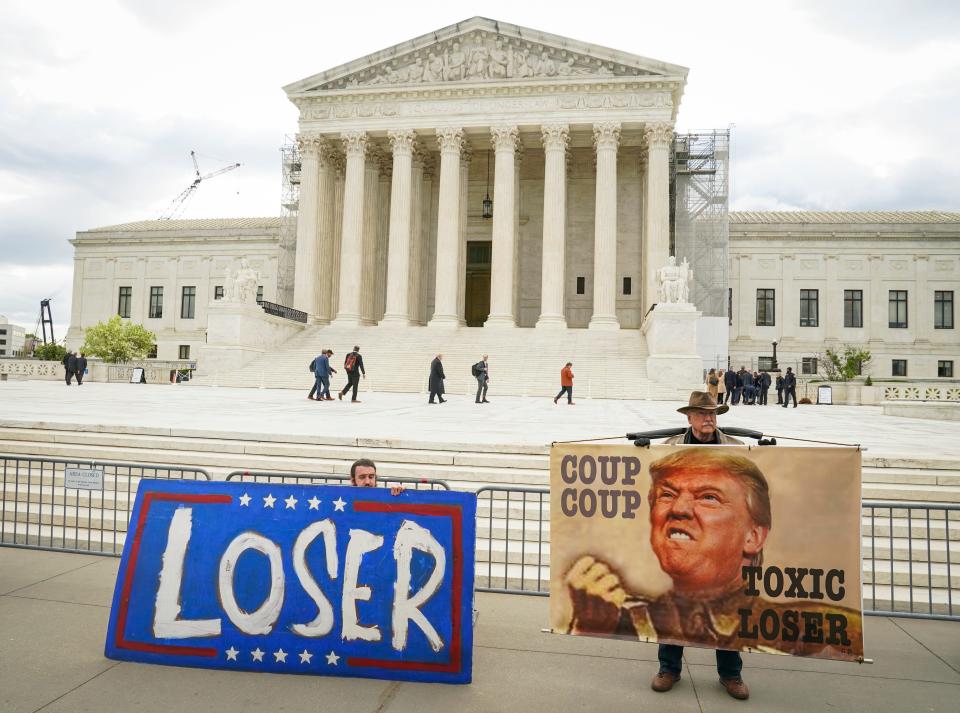
Significance of being the first president to face criminal charges
What should the justices make of the fact that Donald Trump is the first president – former or current – to face criminal charges?
Trump’s lawyers say it’s evidence that presidents can’t be prosecuted.
“The long history of not prosecuting Presidents for official acts, despite ample motive and opportunity to do so over the years, demonstrates that the newly discovered alleged power to do so does not exist,” they wrote in their main brief previewing their oral argument.
Special counsel Jack Smith counters that the fact that no previous president has been prosecuted underscores the unprecedented nature of Trump’s alleged crimes.
--Maureen Groppe
Recent ruling: Supreme Court snubbed House Republicans who dodged metal detectors after Jan. 6
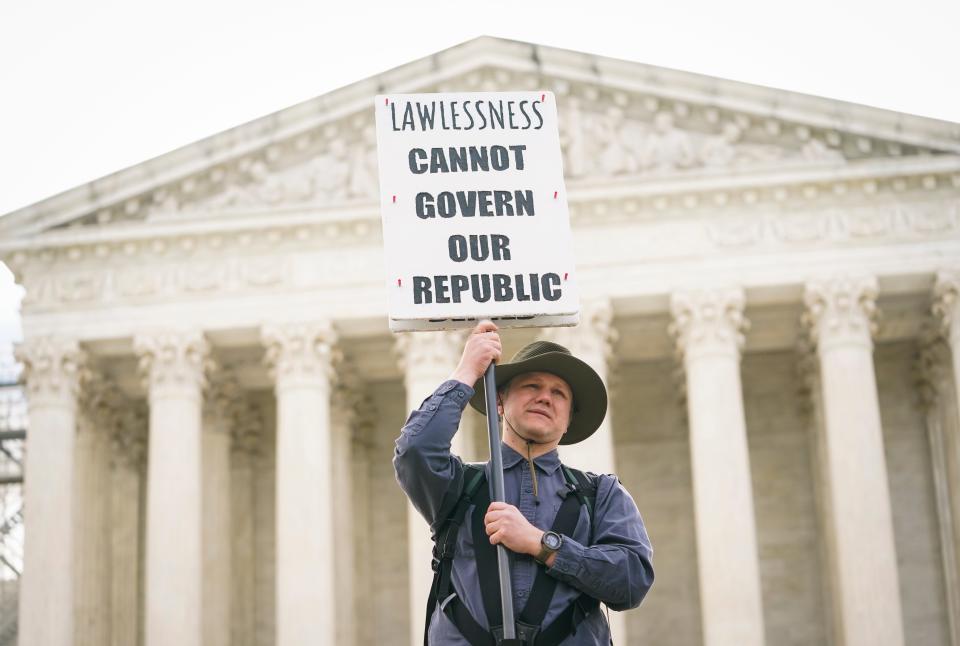
This article originally appeared on USA TODAY: Supreme Court immunity case: Live updates of oral arguments
